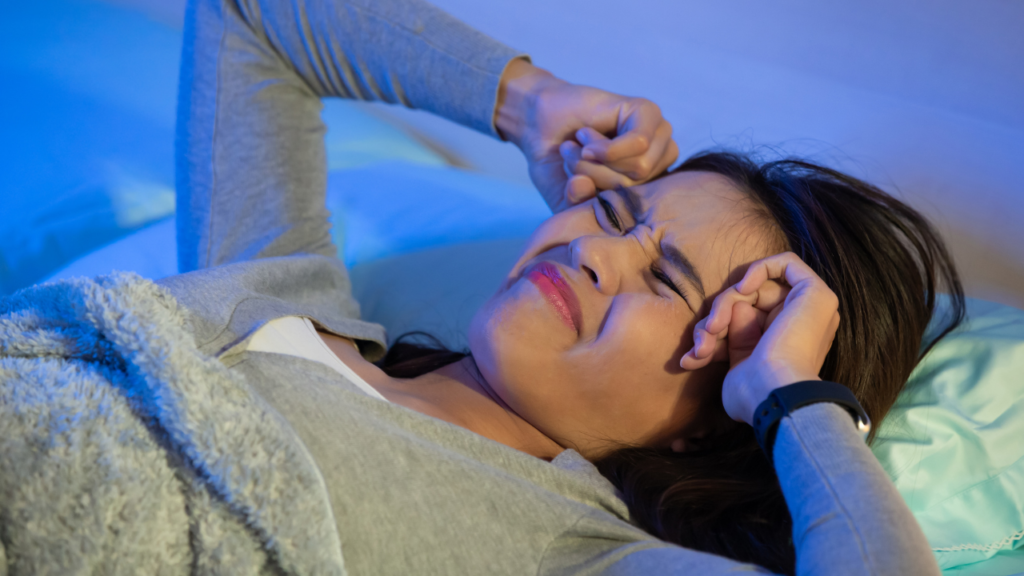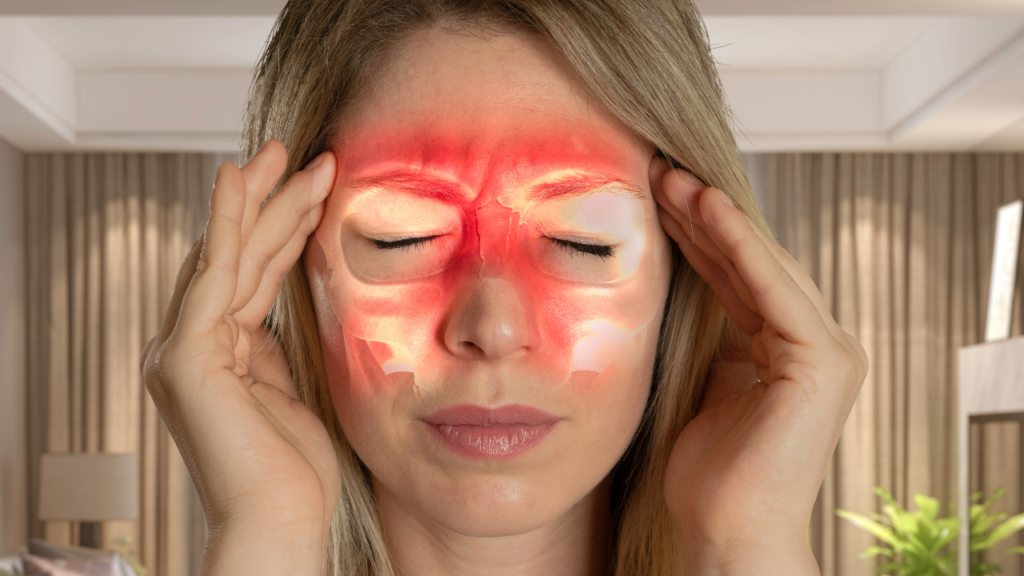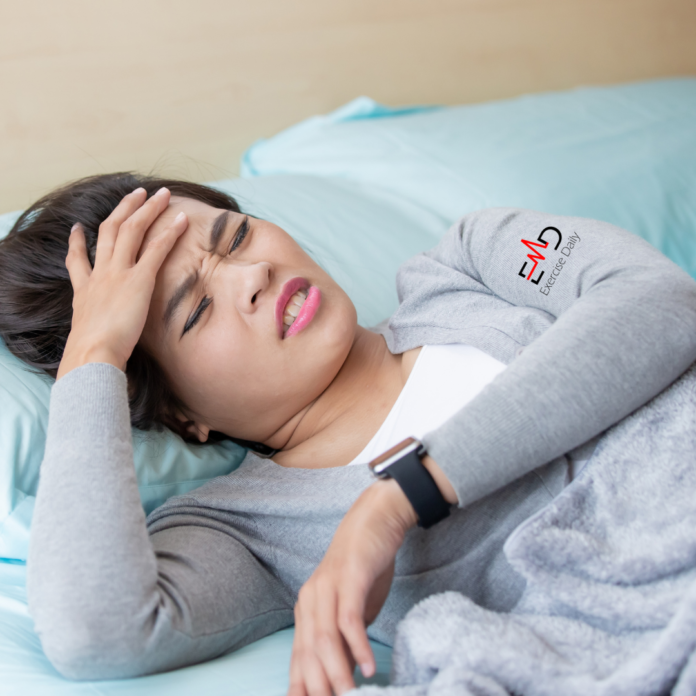Table of Contents
Exercise Daily – If you’ve ever had a sudden headache when bending over or changing positions, it might be frightening. However, it’s typically nothing to be concerned about. Some people complain that their headache worse when lying down. Let’s find out the reasons behind these complaints.
Headaches are not only severe and unpleasant, but they are also quite prevalent. Worldwide, almost half of the adult population suffers from a headache at some point in their lives, according to WHO.
Generally speaking, headaches are divided into two types.
- Primary headaches, in which head pain is the predominant complaint
- Secondary headaches, in which head pain is caused by an underlying disease, such as the common cold.
Learning about the kind of headache you’re having and what could be causing it will aid in your quest for a solution to your problem.
Primary Headache
When headache is the primary or only complaint of a patient, it is most often classified as a primary headache. Tension headache, migraine headache, and cluster headache are the three most prevalent types of primary headache.
Secondary Headache
Those suffering from secondary headaches are those who suffer from head discomfort that is caused by an underlying illness. Secondary headaches may involve a variety of conditions such as positional headache, sinus headache, and cough headache.
All headaches, regardless of their nature, may have a significant impact on your overall health, particularly if the pain is severe. Some of these conditions might be induced or aggravated by changing your body posture. Hence, people say that their headache worse when lying down.

Types of Headaches
The majority of individuals who complain of headaches while bending over are suffering from one of a few different forms of headache. Let’s take a deeper look at each of the many types of headaches and the symptoms that accompany them.
Headache caused by dehydration
In addition to being a secondary headache problem, dehydration headaches are caused by a condition known as dehydration. It is because you lose more fluids than you take in.
The likelihood of experiencing head discomfort rises when you move your body. This is especially true when you walk, lean down, or move your head from side to side.
Other symptoms that you may have include exhaustion, dry mouth, irritability, lightheadedness upon standing up, thirst, and infrequent urine.
It is likely that your symptoms will improve with time and increased water consumption if your dehydration is modest. However, if it is more serious and involves symptoms such as fever, diarrhea, or dark yellow/ brown urine, you should seek medical assistance.
Migraines
A recurring main headache, migraine involves pain on one or both sides of the head. It accompanies other symptoms such as blurred vision, sensitivity to light, sound or smell and seeing light spots. Migraine headaches may also cause nausea and vomiting.
Genetic predisposition increases your chances of getting migraines. However, they may also be caused by specific meals, beverages including alcohol and caffeine, loud noises or bright lights, sleep disruptions, stress, medicine, and physical activity.
For those who have had migraine headaches when standing up or leaning over, it is possible that physical activity serves as a trigger for them.
Sinus Headache
Causing pain and pressure in the sinuses behind the forehead, between the cheekbones, and under the bridge of the nose is a secondary headache. It is caused by a viral infection that produces inflammation.
The symptoms of a sinus headache include headaches that seem like they are coming from your sinuses. Moreover, there can be discomfort in your face that feels full or pressure, nasal congestion or a stuffy nose, exhaustion, and an achy sensation in your upper teeth.

If you complain of headache worse when lying down, sinus headaches may be responsible. Bending over or laying down may cause the pressure, discomfort, or headache to worsen, as well as upon standing up.
Positional Headache
Positional headache, also known as orthostatic headache, low-pressure headache, or postural headache, is a secondary kind of headache. It intensifies when your body changes positions.
While participating in activities or shifting your body from one position to another, if you have positional headache symptoms, you may notice that your pain is more acute while you are doing so.
When you cough or sneeze, when you exercise, when you strain to pass a bowel movement, or when you participate in sexual activity, you may experience increased discomfort.
It is possible that your discomfort may intensify when you shift from one position to another. These include standing, sitting, or bending over. When you lie down, the symptoms of a positional headache tend to subside.
One of the most common underlying illnesses that may induce positional headaches is anemia. Other disorders that can cause positional headaches include spinal fluid leaks, colloid cysts, and brain tumors.
Consider scheduling an appointment with your doctor if you are having pain that you believe may be due to a positional headache. This will allow your doctor to rule out any significant underlying reasons.
Cough Headache
Cough headaches are a rare type of headache disorder in which you develop a sudden headache when bending over or coughing, sneezing, laughing, crying, straining to pass a bowel movement, or blowing your nose.
These headaches are caused by a sudden increase in the amount of mucus in your nasal passages. It is a possibility that your cough headache worse when lying down.
Cough migraines are classified as either primary cough headaches, which are caused by unknown sources, or secondary cough headaches, which are caused by structural issues in the brain.
Primary cough headaches are thought to be innocuous and will go away on their own, however, subsequent cough headaches may need surgical intervention in order to be treated.
In the case of a primary cough headache, the pain may feel like a stabbing or splitting intense pain. A cough, sneeze, strain, or any other movement of the body causes discomfort. It normally lasts just a brief period of time and is intermittent.
These early signs and symptoms are often followed by a dull aching discomfort that lasts for a few hours. Drinking enough water may frequently assist to alleviate your discomfort.
It’s possible that you’re suffering from a secondary cough headache since your symptoms are identical. However, the pain happens more often and lasts for a longer period of time. Blurred vision, feeling unstable on your feet, and dizziness are all possible side effects.
You should see your doctor if you are suffering from any secondary cough headache symptoms. This might help to rule out any underlying structural abnormalities in your brain that may be causing your headache discomfort.
Headache Due to Stroke
It may not always be feasible to identify the pain of a stroke-induced headache from the pain of a tension-type headache. A headache produced by a stroke often occurs quickly and abruptly, but a migraine attack typically occurs slowly and gradually.
Furthermore, stroke has negative symptoms that indicate a loss of neurologic function, such as weakness, numbness, slurred speech, and blindness.
On the other hand, migraine involve symptoms such as bright flashing lights in one’s field of vision, spots or zigzags in one’s field of vision, and the sense of hearing noises such as buzzing or music.
Some migraine symptoms, on the other hand, maybe mistaken for those of a stroke. During a migraine episode, a person who has migraine with aura may have the following symptoms:
- Temporary loss of vision
- Tingling
- Numbness in the face, hands, or other portions of the body
- Speech and language issues
In very rare instances, a migraine episode might result in a stroke.
High Blood Pressure Headache
Headache induced by high blood pressure is a potentially life-threatening condition. This is because this form of headache occurs only when blood pressure is significantly increased to 180/120 mm Hg or above.

Headaches Due to Brain Tumors
Brain tumors are very rare, yet they may cause severe headaches. According to Johns Hopkins Medicine, it is very unusual for a brain tumor to be the source of a headache, but it does happen.
Brain tumor pain may be difficult to differentiate from typical headache pain. However, it is often stronger first thing in the morning, or this type of headache worse when lying down.
Seizures, strong vomiting, weakness, double vision, speech impairment, personality changes, and disorientation may all be signs of a brain tumor. If a brain tumor is suspected, it is critical that the patient has a comprehensive assessment by a doctor.
Cluster Headache
Cluster headaches are technically not life-threatening, yet they may cause such extreme suffering that some patients consider taking their own lives.
These headaches start quickly, awakening individuals from their sleep, and last anywhere from 15 minutes to 3 hours on average. Cluster headaches are characterized by severe pain on just one side of the head.
In addition, there can be a runny nose and red or crying eyes on the side of the head experiencing the headache. Cluster headaches cause a person to feel restless and agitated as a result of the tremendous pain they are experiencing.
Cluster headaches are so-called because they occur in clusters. For example, every day for a month or more, followed by none for a year.
Natural Remedies to Treat Headaches
Drink plenty of water
A lack of proper hydration may result in the development of a headache. Drinking enough water throughout the day and consuming foods high in water content will help you prevent dehydration headaches. If your headache worse when lying down, this might help.
Take Some Magnesium Supplements
Magnesium is a vital element that is required for a wide range of bodily processes. These include blood sugar regulation and nerve communication. It’s worth noting that magnesium has also been found to be a safe and effective treatment for migraine headaches.
Use of Essential Oils
A number of plants’ aromatic components are condensed into essential oils, which are liquids that are extremely concentrated. The majority of them are applied topically, while some may be taken orally. They offer several therapeutic effects.
Using peppermint and lavender essential oils might be particularly beneficial when suffering from a headache. Applying peppermint essential oil to the temples may alleviate the symptoms of tension headaches.
Meanwhile, when applied to the upper lip and breathed, lavender oil particularly helps in alleviating migraine discomfort and related symptoms.
Take Vitamin B-Complex
It is a collection of water-soluble micronutrients known as the B vitamins, and they have a wide range of functions in the body. For example, they contribute to the production of neurotransmitters and the conversion of food into energy.
Some B vitamins may have a preventative impact on headaches.
Apply a Cold Compress
Using a cold compress to relieve your headache symptoms may be beneficial. Applying cold or frozen compresses to the neck or head region reduces inflammation, inhibits nerve transmission, and constricts blood vessels.
All of these are beneficial in reducing headache discomfort and reducing inflammation. It might also help if your headache worse when lying down.
Take into Consideration Taking Coenzyme Q10.
It is a chemical created by the body in its natural state. It aids in the conversion of food into energy and serves as a potent antioxidant at the same time.
Consider Acupuncture As a Treatment Option
Acupuncture is a method used in Traditional Chinese medicine. It involves putting needles into the skin to stimulate specific areas of the body. The use of acupuncture to treat persistent headaches may be a good option if you’re seeking a non-invasive treatment option.
Try Yoga
Yoga is a wonderful method to reduce stress, develop flexibility, lessen discomfort, and improve your overall quality of life. It can be done anywhere and at any time. Yoga may also help to lower the severity and frequency of your headaches if you practice it regularly.
Consider Using a Herbal Remedy
Certain herbs, such as feverfew and butterbur may help to alleviate headache symptoms. Feverfew is a flowering plant that has anti-inflammatory qualities. It is native to the Mediterranean region.
A perennial plant native to Germany, butterbur root has anti-inflammatory properties similar to those of feverfew and is significant in treating a variety of ailments.
In the prescribed dosage, feverfew is usually safe. Although it is beneficial, butterbur should be used with care since unpurified versions might cause liver damage. However, it is beneficial if your headache worse when lying down.
Drink a Cup of Ginger Tea
Several medicinal components, such as antioxidants and anti-inflammatory molecules, are present in the root of the ginger plant. Furthermore, ginger may help to alleviate nausea and vomiting, which are frequent symptoms of severe headaches and migraines.
Frequently Asked Questions
Why is my headache worse when lying down at night?
Cervicogenic headache, which is more common at night and causes neck pain radiating to the occiput and anteriorly to the forehead is responsible for headache when lying down. It awakens the person and is caused by a mechanical neck posture during sleep.
Why does my head hurt when I lay down but not stand up?
In addition to cerebrospinal fluid (CSF) leak, there is a disorder known as postural orthostatic tachycardia syndrome. It may induce an orthostatic headache.
A positional headache may also be caused by a variety of different disorders that involve the neurological system, connective tissue, and bones in uncommon instances.
What are the red flags for headaches?
- Sudden onset of headache
- Headache after the age of 50
- Increased frequency or severity of headache
- New onset of headache in the presence of an underlying medical condition
- Headache in the presence of a concurrent systemic illness
- Focal neurologic signs or symptoms
What does a COVID headache feel like?
Some of the most noticeable characteristics of a COVID-19 headache are as follows: Itching, pressing or stabbing feeling. It takes place on each side (across the whole head).
The patient might complain of acute pressure that does not respond to standard pain medications such as ibuprofen and acetaminophen
Do brain tumor headaches come and go?
The headache associated with a brain tumor does not go away. Despite the fact that you are sleeping, it is continual (or grows more frequent). In addition, it may be accompanied by additional worrisome symptoms such as seizures and/or fainting.
Take Away
Headaches are uncomfortably unpleasant, but they are not dangerous. The majority of them will go away on their own if you use over-the-counter drugs or natural therapies. For some people, headaches may be a warning indication that they are suffering from a medical issue.
If you try one of these remedies, feel free to discuss in the comments section below.
















